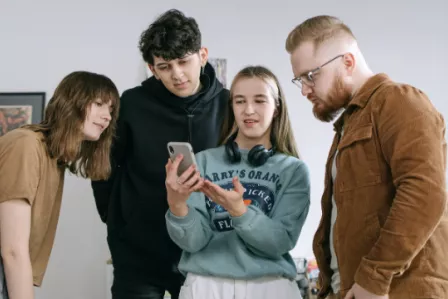Dozens of schools, institutions and organisations in Bulgaria celebrated the 18th Safer Internet Day on Tuesday, 9 February 2021 with various events and initaiatives. The central national event was organised by the Bulgarian Safer Internet Centre (SIC) and held online with the active participation of its Youth Panel. Around 80 young people, teachers and professionals took part in the event, which was also streamed live on the centre’s Facebook page. Schools nationwide gathered their pupils and followed the live event on screen.

At the start of the event, the winning three Cyberscout squads were announced; the most active groups of 12-year-old pupils who have passed training under the Cyberscout Programme of the Safer Internet Centre and organised a number of events and initiatives to transfer their knowledge and skills to their peers.
The central part of the event was dedicated to the topic of false information on the internet and the risks it poses to uninformed users. Members of the Youth Panel chose the topic and prepared and demonstrated short role-playing debates on the most prevalent types of false information, especially concerning the COVID-19 pandemic. After the debates, all participants discussed the dangers of fake news, the ways that such news becomes viral, and how it could be stopped, minimised and debunked.
The video streaming on Facebook reached more than 11,000 viewers who also commented on the issues. The video continues to be the most popular post on the Safer Internet Centre’s profile, and the number of people reached has now surpassed 20,000. It was also available via the Safer Internet Centre’s YouTube channel.
Safer Internet Day 2021 also marked the start of the traditional Media Literacy Days campaign in Bulgaria which runs for the following two months. The campaign is organised by the Coalition for Media Literacy in Schools which was co-founded by the Bulgarian Safer Internet Centre and unites more than 20 organisations and experts. The coalition plans dozens of events and initiatives to attract attention to the need for digital and media literacy as the best way to fight fake news and manipulated information online.
Find out more about Safer Internet Day in Bulgaria. Alternatively, find out more about the work of the Bulgarian Safer Internet Centre, including its awareness raising, helpline, hotline and youth participation services – or find similar information for Safer Internet Centres throughout Europe.
Dozens of schools, institutions and organisations in Bulgaria celebrated the 18th Safer Internet Day on Tuesday, 9 February 2021 with various events and initaiatives. The central national event was organised by the Bulgarian Safer Internet Centre (SIC) and held online with the active participation of its Youth Panel. Around 80 young people, teachers and professionals took part in the event, which was also streamed live on the centre’s Facebook page. Schools nationwide gathered their pupils and followed the live event on screen.

At the start of the event, the winning three Cyberscout squads were announced; the most active groups of 12-year-old pupils who have passed training under the Cyberscout Programme of the Safer Internet Centre and organised a number of events and initiatives to transfer their knowledge and skills to their peers.
The central part of the event was dedicated to the topic of false information on the internet and the risks it poses to uninformed users. Members of the Youth Panel chose the topic and prepared and demonstrated short role-playing debates on the most prevalent types of false information, especially concerning the COVID-19 pandemic. After the debates, all participants discussed the dangers of fake news, the ways that such news becomes viral, and how it could be stopped, minimised and debunked.
The video streaming on Facebook reached more than 11,000 viewers who also commented on the issues. The video continues to be the most popular post on the Safer Internet Centre’s profile, and the number of people reached has now surpassed 20,000. It was also available via the Safer Internet Centre’s YouTube channel.
Safer Internet Day 2021 also marked the start of the traditional Media Literacy Days campaign in Bulgaria which runs for the following two months. The campaign is organised by the Coalition for Media Literacy in Schools which was co-founded by the Bulgarian Safer Internet Centre and unites more than 20 organisations and experts. The coalition plans dozens of events and initiatives to attract attention to the need for digital and media literacy as the best way to fight fake news and manipulated information online.
Find out more about Safer Internet Day in Bulgaria. Alternatively, find out more about the work of the Bulgarian Safer Internet Centre, including its awareness raising, helpline, hotline and youth participation services – or find similar information for Safer Internet Centres throughout Europe.
- < Previous article
- Next article >












